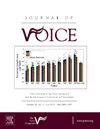Auditory-Perceptual Judgment of Vocal Resonance in Carnatic Singers by Different Groups of Listeners
IF 2.4
4区 医学
Q1 AUDIOLOGY & SPEECH-LANGUAGE PATHOLOGY
引用次数: 0
Abstract
Aim
This study was aimed at evaluating the auditory perceptual judgments of vocal resonance by professional singers, speech-language pathologists (SLP) with singing training, and SLPs without singing training.
Objectives
(a) To examine the auditory-perceptual judgments of the phonation samples of professional singers obtained before and after resonant voice therapy (RVT) by professional singers, SLPs with singing training, and SLPs without singing training. (b) To compare the agreement between the auditory-perceptual judgments of the phonation samples obtained before and after RVT by professional singers, SLPs with singing training, and SLPs without singing training
Method
Three groups of judges formed the participants of the study: group A (professional singers), group B (SLPs with singing training), and group C (SLPs without singing training). The judges were instructed to evaluate the perceptual vocal resonance in the voice samples of two groups of trained Carnatic classical singers.Among these groups, One group received RVT training, and their voice samples were obtained before and after the training, while the other group acted as a control. An auditory perceptual 3-point rating scale was used to rate the vocal resonance. Descriptive and inferential statistical analyses and inter-rater agreement tests were done to understand the auditory perceptual judgment of vocal resonance by the three groups of judges.
Results
The results of the Wilcoxon signed rank test indicated that the post-training auditory perceptual ratings by group A (│Z│ = 2.66; P = 0.008) and group B (│Z│ = 2.36; P = 0.018) were significantly different from their pre-training perceptual rating scores. The post-training ratings by group C were not statistically different compared to their pre-training scores. Also, good agreement levels were found on the weighted Cohen’s Kappa coefficient test performed on the judgments made by groups A and B.
Conclusion
The listeners compare the voice samples to their own internal representations of a voice which would exclusively depend on the experiences of the listeners. In that way, the perception of intricate voice features of singers, like vocal resonance, could be challenging for SLPs with no experience in singing. The results of this study propose specific training in auditory perceptual judgments for SLPs to ensure efficient and independent service delivery to elite vocal performers like singers.
不同听众群体对卡纳蒂克歌手声乐共鸣的听觉知觉判断
目的评价专业歌手、接受过歌唱训练的语言病理学家和未接受过歌唱训练的语言病理学家对声乐共鸣的听觉感知判断。目的(a)考察专业歌手、接受过歌唱训练的slp和未接受过歌唱训练的slp在共振声治疗(RVT)前后对专业歌手发声样本的听觉感知判断。(b)比较专业歌手、接受过歌唱训练的slp和未接受过歌唱训练的slp在RVT前后对发声样本的听觉知觉判断的一致性。方法将评委分为三组:A组(专业歌手)、b组(接受过歌唱训练的slp)和C组(未接受过歌唱训练的slp)。评委们被要求评估两组训练有素的卡纳蒂克古典歌手的声音样本中的感知声乐共鸣。其中,一组接受RVT训练,分别在训练前后采集其语音样本,另一组作为对照。使用听觉感知3分量表对声音共振进行评分。通过描述性统计分析、推断性统计分析和评判员间一致性检验来了解三组评判员对声乐共鸣的听觉知觉判断。结果Wilcoxon符号秩检验结果显示,A组(│Z│= 2.66;P = 0.008)和B组(│Z│= 2.36;P = 0.018)训练后的听觉知觉评分与训练前比较差异有统计学意义。C组的训练后评分与训练前评分相比无统计学差异。此外,在对A组和b组的判断进行的加权科恩卡帕系数测试中,发现了良好的一致性水平。结论:听者将声音样本与他们自己对声音的内部表征进行比较,这完全取决于听者的经验。这样,对歌手复杂的声音特征的感知,比如声乐共鸣,对于没有唱歌经验的slp来说可能是一个挑战。本研究的结果提出了对slp进行听觉感知判断的具体训练,以确保为歌手等精英声乐表演者提供有效和独立的服务。
本文章由计算机程序翻译,如有差异,请以英文原文为准。
求助全文
约1分钟内获得全文
求助全文
来源期刊

Journal of Voice
医学-耳鼻喉科学
CiteScore
4.00
自引率
13.60%
发文量
395
审稿时长
59 days
期刊介绍:
The Journal of Voice is widely regarded as the world''s premiere journal for voice medicine and research. This peer-reviewed publication is listed in Index Medicus and is indexed by the Institute for Scientific Information. The journal contains articles written by experts throughout the world on all topics in voice sciences, voice medicine and surgery, and speech-language pathologists'' management of voice-related problems. The journal includes clinical articles, clinical research, and laboratory research. Members of the Foundation receive the journal as a benefit of membership.
 求助内容:
求助内容: 应助结果提醒方式:
应助结果提醒方式:


